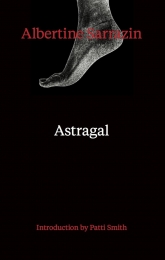Albertine Sarrazin was more or less forgotten not long after her surprising death from complications with kidney surgery in 1967, aged only 29 and at the height of her fame.
. Only a few years before she had published Astragal and was compared to the fabulous French writer Jean Genet.
Upon the success of her first novel, she put out another two, La Cavale and La Traversière, before her untimely demise. Now she has been resurrected by musician and author Patti Smith, who suggested her own publisher New Directions take on the reissue of Patsy Southgate’s translation of Astragal.
Astragal is a semi-autobiographical novel about a young woman named Anne who breaks out of jail and hurts the talus bone (or astragal in French) in one of her ankles in the process. On the lam, she is soon taken in by Julien, a young man with an equally shady past, and with whom she falls in love.
Julien helps her move around to avoid being found by the police while she’s trying to heal. Her complete dependency on Julien both repels and attracts her, having been a very independent woman previously. Also, she is torn between Julien and a prison love of hers with whom she had intended to reconnect.
Sarrazin’s writing on Anne’s homosexual affairs is draped in what’s probably a purposely obscure language that leaves the reader unsure of her intentions and meanings. Nevertheless, if reality is something to judge by, it is with Julien that Anne – and Albertine – both end up: the author married her real life Julien Sarrazin and stayed with him until she passed.
It is the strangeness, or otherness, of the language, rather than the subject, that makes this book so interesting. The fact that Sarrazin was from an Algerian-French background, and that she spent a lot of her life in care, plus her experiences of prostitution and crime, all doubtless feed into the border language that she uses, which gives her writing its edge.
Sarrazin, like her character Anne, remains uncommitted, on the fringe looking in, not sure if she likes what she sees. And it is this battle with the ambivalence of belonging and staying independent that saturates almost every page.
It would have been intriguing to see how Sarrazin changed as a writer if she had been allowed to find stability and contentment for a longer period – or perhaps it would have been the death knell of her invention.












